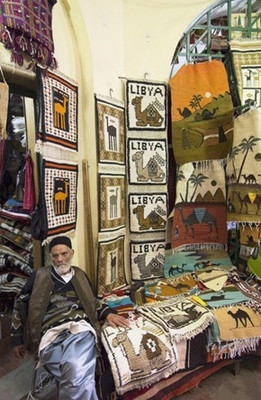商業報道
Business in Libya
在利比亞做生意
A post-Qaddafi pause
后卡扎菲時代的停滯
Despite the opportunities, most foreign investors are so far staying away
盡管滿地的機會,但外國資本還是敬而遠之
A DRIVE down Gargaresh Street in central Tripoli suggests that foreign investors are having a ball in post-revolution Libya.
外國投資者要想在革命后的利比亞找樂子,就開車到的黎波里市中心的加加萊西大街。
Debenhams, a British department-store chain, opened last month.
上個月,英國連鎖百貨商場德本漢姆上個月就在那兒開了家分店。
Young Libyans flock to Cinnabon, an American purveyor of sticky buns that arrived last year.
利比亞的年輕人則結伴到去年入住的黎波里的美國黏包店Cinnabon去消費。
BurgerFuel, a New Zealand chain, plans to launch.
新西蘭連鎖店BurgerFuel也有落戶此地的打算。
Business is booming, boasts Husni Bey, a local industrialist whose company runs the franchises for several Western chains.
胡斯尼·貝不無夸耀道:商業要興盛起來了。胡斯尼是當地一位實業家,他的公司擁有好幾家西方連鎖店的特許經營權。
Franchising is a relatively low-risk way of getting into this growing market of 6m people.
給當地企業以特許經營權,以這種方式進入這個有600萬人口的新興市場風險相對較低。
But few foreign firms have yet been brave enough to set up their own operations.
但是很少有外國公司有勇氣跑到利比亞去設置自己的辦事機構。
 Investors who two years ago lauded Libya as a new frontier after 42 years of rule by Libya's eccentric dictator, Muammar Qaddafi, now speak in sombre tones.
Investors who two years ago lauded Libya as a new frontier after 42 years of rule by Libya's eccentric dictator, Muammar Qaddafi, now speak in sombre tones.
兩年前,利比亞在結束了那位特立獨行的獨裁者穆阿邁爾·卡扎菲42年的統治之后被投資者視為新興投資領域,而如今投資者的口風卻又變了。
Trade delegations have stopped arriving so frequently.
貿易代表團不再像之前那么來得頻繁。
Many firms are fed up with drinking tea and being nice but getting no further, says Alex Warren, the editor of Libya Report, a business website.
商業網站利比亞報告的編輯阿萊士·沃倫說:除了感受到利比亞人的友好客氣,其他什么都得不到,很多公司對此早已厭倦。
Libya remains tempting.
不過利比亞依然很誘人。
The oil-rich country is virgin territory.
這個生產石油的國家尚還是塊處女地。
Recent rises in state salaries have made Libyans, already well-off for this part of the world, keen to spend.
而最近利比亞全國漲工資,這讓利比亞人已然邁入小康社會,他們很樂意消費。
So is the government, since the country's infrastructure is so poor.
加上利比亞基礎設施落后,利比亞政府也樂意敞開錢袋。
Before the war it signed deals to build roads, railways, houses, hospitals and schools.
早在內戰前,利比亞就簽了修公路、鐵路,建房子、醫院、學校的合同。
Now that international sanctions have been lifted, investment should be pouring in.
如今,國際制裁已經取消,境外投資自當涌入。
One problem is insecurity.
但安全依然是個問題。
Benghazi, the country's second-biggest city, is still a no-go area for Americans, Britons and the French.
利比亞第二大城市班加西到現在還是美英法三國人的禁區。
But rampant militias are not the main deterrent, says Kevin Virgil of Pathfinder Capital:
不過在探路者資本公司的凱文·維吉爾看來,猖狂的民兵并不是主要障礙,探路者資本是一家總部位于倫敦的投資公司,
his London-based investment firm also works in Iraq, which is getting much investment despite being at least as dangerous.
這家公司在伊拉克也有業務,盡管伊拉克同樣也很危險,但探路者在那兒的投資正在不斷加大。
The bigger worry is red tape.
更大的問題來源于利比亞的官僚主義。
Muddled property rights make it difficult to buy land or provide collateral for loans.
繁雜的產權讓買地和為貸款提供抵押物都變得困難重重。
A well-meaning attempt to stamp out corruption has slowed down enterprise.
而本來好心的反腐舉措也拖累了經濟大局。
In the World Economic Forum's competitiveness rankings Libya is 108th out of 148 countries.
在世界經濟論壇的競爭力排名中,利比亞在148個國家中僅列108位。
The new authorities took a step backwards last year by enacting a law capping foreign ownership in smaller joint ventures at 49%, down from 65%, while increasing the minimum investment to 1m dinars.
去年利比亞新政府立法要求在較小規模的合資企業里境外股份只能占49%,而之前的比例是65%,同時還增加最低投資要求,達到100萬第納爾;
Those seeking 100% ownership must put up at least 5m dinars of capital.
對于尋求100%控股的外資企業投資金額必須達到500萬第納爾,這無疑是在開倒車。
An odd rule requires the foreign partner firms to be at least ten years old.
還有個奇怪的規定要求在利投資的境外合伙企業需成立10年以上。
These restrictions suit a new oligarchy, incorporating many who were cosy with the old regime, which has access to capital unavailable to local investors and to connections that foreigners lack.
這些限制對于那些與舊政權息息相關的寡頭政治是有利的,而這種寡頭政治一頭連著資本匱乏的國內投資者,一頭連著打不進利比亞市場的外國人。
This year International Hospitals Group, a British health-care provider, signed a deal, said by local media to be worth 2 billion dinars, to build nine clinics.
據當地媒體報道,今年英國醫療供應商國際醫院集團和利比亞政府簽署了一項建造總值達20億第納爾的9所診所的協議,
But the government is scared to sign many such contracts because its mandate is temporary—a new constitution and elections are due next year.
但利比亞政府卻不敢簽這個單子,因為此政府只是個臨時政府,而新憲法和選舉要到明年才出來。
Cranes stand idle over half-finished buildings. Most contracts negotiated under the old regime are yet to restart.
起重機被閑置在半拉子工地上,大多數的合同都是跟前政權簽署的,都還未重啟。
Militias are blockading oil ports, including the two most important, Sidra and Ras Lanuf.
民兵封鎖了包括錫德拉和拉斯拉努夫這兩個最重要的口岸在內的石油港口。
That has disrupted oil exports, which were almost back to pre-war levels—the most positive sign of economic recovery.
這損害了利比亞的石油出口,致使這一行業幾乎回到戰前水平,而要知道這個行業是經濟復蘇最重要的標記。
A few foreign firms are being brave, especially ones from Turkey, South Korea and China.
少數外國公司則顯得勇而無畏,特別是土耳其、韓國和中國的企業。
Turkey's TAV Construction has restarted work on expanding Tripoli's airport.
土耳其的TAV建設公司已經重啟的黎波里機場的擴建工程;
A Marriott hotel in the capital, part-owned by Daewoo of South Korea, is being reopened.
韓國大宇集團擁有部分股權的的黎波里萬豪酒店也重新開張;
Chinese companies are building railways and housing.
中國的公司則在修路蓋房。
Last year Turkish exports to Libya almost tripled in value to $2.1 billion.
去年土耳其對利比亞的出口幾乎翻了三倍,達到21億美元。
Turkish Airlines has started new routes to the thriving third city, Misrata, and Sebha.
土耳其航空也開辟了到利比亞第三大城市米蘇拉塔和塞卜哈的新航線。
Mr Virgil remains hopeful. His company plans to invest in the next 12 months.
維吉爾依然滿懷希望,他的公司計劃在未來一年內作出投資。
Banking is just one sector that needs reform and does not involve dealing directly with the government.
銀行業是利比亞僅有的需要改革但不需和政府打交道的領域。
For those willing to go on the ground and take a punt, says Mr Virgil, there are profits to be had.
維吉爾說:對于那些想撈一把的人來說,利比亞油光可鑒。
 Investors who two years ago lauded Libya as a new frontier after 42 years of rule by Libya's eccentric dictator, Muammar Qaddafi, now speak in sombre tones.
Investors who two years ago lauded Libya as a new frontier after 42 years of rule by Libya's eccentric dictator, Muammar Qaddafi, now speak in sombre tones.
 Investors who two years ago lauded Libya as a new frontier after 42 years of rule by Libya's eccentric dictator, Muammar Qaddafi, now speak in sombre tones.
Investors who two years ago lauded Libya as a new frontier after 42 years of rule by Libya's eccentric dictator, Muammar Qaddafi, now speak in sombre tones.